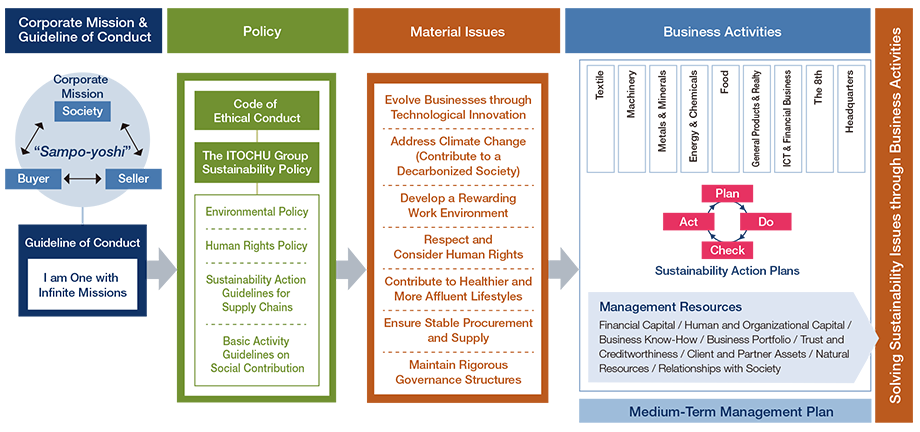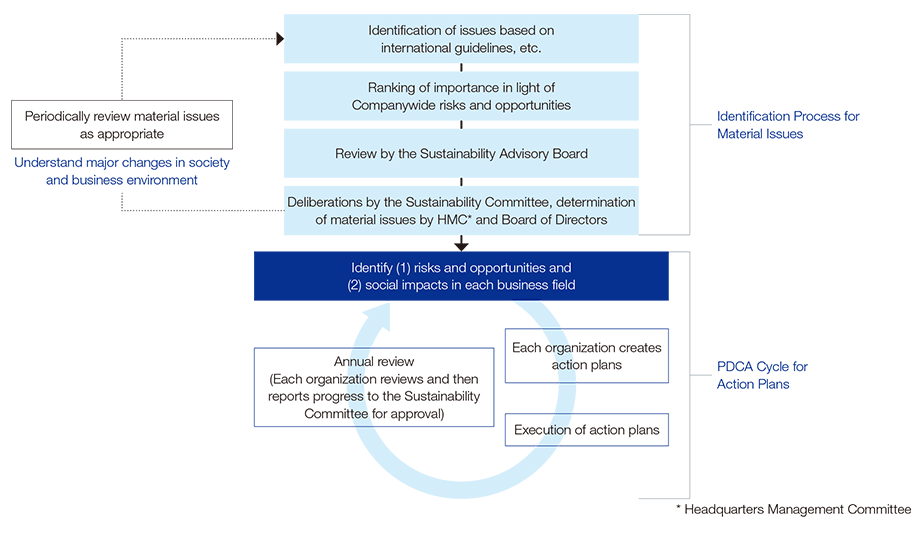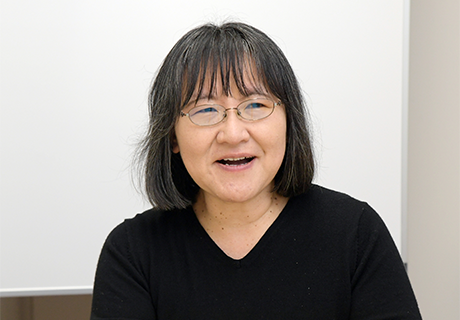Initiatives to Promote Sustainability
Sustainability Promotion Flow
Under The ITOCHU Group Sustainability Policy in accordance with its corporate mission and changes in the external environment, ITOCHU promotes sustainability initiatives systematically throughout its organization. Of particular note, each Division Company and administrative division incorporates ITOCHU’s material issues, which are identified as issues to be addressed with priority, into the Sustainability Action Plans. We will continue to sustainably enhance corporate value and resolve social issues at the same time through our business activities, namely trade and business investment, while ensuring that we maintain and improve profitability.
The Sustainability Management Division plans measures to advance sustainability. After these are decided by the CAO, they are carried out by each organization.
The Sustainability Committee deliberates and makes decisions concerning formulation and revision of basic policies and important matters. Furthermore, through dialogue with external stakeholders such as the Sustainability Advisory Board, we gain an understanding of society’s expectations and demands, etc., which we apply in our efforts to promote sustainability.

Expanding Sustainability-Related Disclosure
Each year, ITOCHU publishes an ESG report for the purpose of furthering the understanding of its policies, approaches, targets, systems, and specific initiatives for promoting sustainability among a broad range of stakeholders, including investors, shareholders, and business partners. In the ESG report, the Company mainly discloses ESG performance data and details about initiatives undertaken in the previous fiscal year to contribute to the SDGs.
Our proactive attitude toward disclosure has helped improve our sustainability rating. Going forward, we will continue expanding sustainability-related disclosures while emphasizing dialogue with stakeholders.(→ ESG Report)
Identification Process for Material Issues and Incorporation into Action Plans
Since ITOCHU first identified material issues that pertain to sustainability from an ESG perspective in FYE 2014, we have conducted reviews as appropriate based on trends in the international community and the expectations of stakeholders. In FYE 2019, we revised our material issues, incorporating elements from our fields of strength in health management and the consumer sector, and made revisions to content with an eye on contributing to achieving the Paris Agreement and the SDGs adopted by the United Nations.
Furthermore, as a specific initiative, each Division Company and administrative division incorporates the identified material issues into Sustainability Action Plans for each business field. First, each organization identifies risks and opportunities and social impacts in each business field, and then sets medium- to long-term targets, draws up action plans with measures and performance indicators for achieving these targets, reviews progress, and finally reports achievements to the Sustainability Committee, with the intention of making steady progress through a PDCA cycle.

Viewing Climate Change as an Opportunity
In its medium-term management plan, ITOCHU has set a target of offsetting GHG emissions to zero by 2040. For example, by constructing renewable energy power plants, the Company helps its customers reduce their GHG emissions through the use of this renewable energy and strives to reduce global GHG emissions. When building new renewable energy power plants, there is a possibility that the Company’s Scope3 emissions will increase. By accelerating such initiatives, however, ITOCHU intends to reduce its own emissions, including Scope3, and make a greater contribution to reducing GHG emissions overall. I believe this is a rather ambitious target.
At the same time, ITOCHU also aims to achieve net zero GHG emissions by 2050. As a part of this goal, the Company provides training videos to its employees to learn more about how to perform life cycle assessment and calculate Scope3 emissions, for example, and these videos are also used as a marketing tool for customers who are keen to use carbon-free products. In addition to envisioning grand solutions for the future, ITOCHU’s approach starts with reducing emissions in its own businesses, and I believe this is the best attitude to reduce GHG emissions. I think ITOCHU’s efforts are a useful reference for other companies as well. I am strongly encouraged that ITOCHU, which supports the businesses of numerous customers as a general trading company, views efforts to reduce GHG emissions as a business opportunity rather than just a cost burden and is proactively executing initiatives.

Yukari Takamura
Member, Sustainability Advisory Board (FYE 2022)
Professor of Institute for Future Initiatives, The University of Tokyo. Ms. Takamura specializes in international law and environmental law studies. Her main research topics are legal problems with international environmental treaties and legal policies concerning climate change and energy. She chairs the Central Environmental Council, Tokyo Environmental Council, and Procurement Price Calculation Committee for Feed-in Tariff Scheme, while also serving as a member of many other committees inside and outside Japan.
